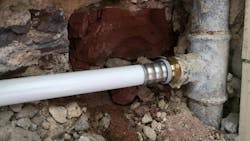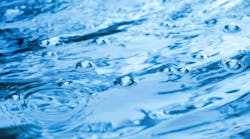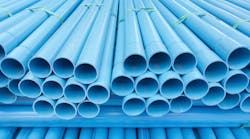How industry standards support infrastructure water safety
Given the direct correlation between human health and drinking water, the water industry continues to prioritize improving water quality for consumers. In 2021, the US government announced the Lead Pipe and Paint Action Plan, which will replace lead pipes across the nation over several years. This project is a major turning point for public health, as lead in water has been linked to infertility, development disorders, neurological disorders and more. This project provides a major opportunity for water product manufacturers to partake in a major health initiative for our country.
It is important for both manufacturers and professionals to understand that state drinking water regulations and local plumbing codes require that replacement materials, depending on the type of material, are third-party certified to either NSF/ANSI/CAN 61: Drinking Water System Components – Health Effects which includes NSF/ANSI/CAN 372: Drinking Water System Components – Lead Content, or NSF/ANSI 14: Plastics Piping System Components and Related Materials. Thoroughly understanding the project details and NSF’s standards and certification process is key in navigating the complexities of water system maintenance and improvement.
What is NSF Certification?
All three standards included in the infrastructure plan requirements are recognized worldwide due to their credibility and reputation for quality and safety. They streamline the material safety requirements and provide a gold standard of what quality the products should meet. NSF certification to these standards assures suppliers, retailers, regulators and consumers that an independent organization has reviewed a product or system to comply with specific standards for safety, quality, sustainability or performance. Recognized by regulatory agencies at the local, state, federal and international levels, certification demonstrates that a product or service complies with all standard requirements.
NSF certification plays a pivotal role with consumers as it removes the guesswork and blind trust consumers would otherwise need to have in a brand or product in performing to its claims. NSF’s independent certification is crucial when it comes to products, especially in the water industry, as most contaminants are undetectable by taste and smell. Manufacturers who earn third-party certification demonstrate their dedication to maintaining water quality and safety for end users.
Required Standards for the Lead Pipe and Paint Action Plan
There are three main standards required for products used in the US infrastructure project: NSF/ANSI/CAN 61, which includes NSF/ANSI/CAN 372 and NSF/ANSI 14.
NSF/ANSI/CAN 61
Since its inception in 1989, NSF/ANSI/CAN 61 has played an integral role in safeguarding human health by setting standards for materials and products in contact with drinking water. It covers a wide range of components, from pipes to mechanical devices, ensuring that all aspects of water systems meet rigorous safety criteria. With its status as a national standard in both the US and Canada, NSF/ANSI/CAN 61 sets the benchmark for water system integrity and safety.
NSF/ANSI 14
NSF/ANSI 14 is required by state and local codes, and it establishes minimum requirements for physical performance, quality assurance and health effects for plastic piping system components and related materials. It ties in closely to NSF/ANSI/CAN 61 because potable water products must meet the health effects requirements of that standard as well. This standard applies to drinking water, sewer piping, oil pipelines, cooling, gas, electrical conduits, drain piping and more.
NSF/ANSI/CAN 372
Lead content is the largest concern in the Lead and Paint Action Plan. Therefore, it is important to note that NSF/ANSI/CAN 372, which covers lead requirements, is now included in NSF/ANSI/CAN 61. Products certified to NSF/ANSI/CAN 61 and NSF/ANSI 14 for potable water application are required to meet the lead content requirements of NSF/ANSI/CAN 372. Products, including plastic pipe and fittings and plumbing products must meet the maximum lead content limit of 0.25% outlined in this standard.
Third-Party Testing and Certification
Leading organizations accredit NSF's testing and certification services to ensure impartiality and validity of results. Manufacturers seeking certification must undergo rigorous evaluations with no influence over safety assessments. This involves providing detailed product formulation information and undergoing on-site audits of production facilities. Samples are collected and tested in NSF labs to ensure compliance with standard specifications. Importantly, this testing is not a one-time event; facilities undergo regular inspections to maintain certification and quality control, reflecting the commitment to ongoing quality assurance.
The Value of Specialized Laboratory Testing
Several laboratories specialize in pipe testing, including PSILab, a US-based advanced product testing laboratory specializing in plastic pipe, pipe materials and other polymeric and composite products. In March 2024, NSF acquired PSILab, which offers material properties and large-diameter pipe testing, hydrostatic pressure and burst testing among many other services for the plastic pipe industry. The acquisition of PSILab provides NSF with additional capacity to test plastic pipes, including distribution and service line pipes that fall under the US infrastructure project. Furthermore, large-diameter pipe manufacturers seeking NSF certification now have a more streamlined testing process by working with NSF to test their products.
Leading with Science
Those selecting products for the infrastructure project should utilize best practices to improve and build trust in our nation’s water quality. NSF Certified Products provide transparency, helping those looking for certified materials to make informed choices. While NSF standards serve as a vital reference point, it is crucial to understand that plastic piping and plumbing products are regulated through plumbing codes and states’ water authorities ensuring compliance with standards like NSF/ANSI/CAN 61, NSF/ANSI 14, and NSF/ANSI/CAN 372.
In conclusion, the journey of plastics pipes and plumbing products from production to certification is a multifaceted process grounded in science and rigorous evaluation. While challenges may arise, the commitment to ensuring the integrity of our water systems remains steadfast. Through testing and certification to trusted standards that are required for the infrastructure project, we can empower communities to trust in the safety and reliability of their water supply, safeguarding public health for generations to come.
About the Author

Nasrin Kashefi
Nasrin Kashefi is the Director of Global Plastics and Plumbing Programs at NSF and has over 30 years of experience. Kashefi’s global team assists plastic piping and plumbing product manufacturers in obtaining NSF certification to health and safety standards.
Kashefi holds a Bachelor of Arts in public relations and a Master of Arts in interpersonal and organizational communication from Eastern Michigan University. She serves on the Plastic Pipe Institute (PPI) Hydrostatic Stress Board, Plastics Pipe and Fitting Association, PVC Pipe Association, ASTM F17 Committee and NSF Standard 14 technical committees.


